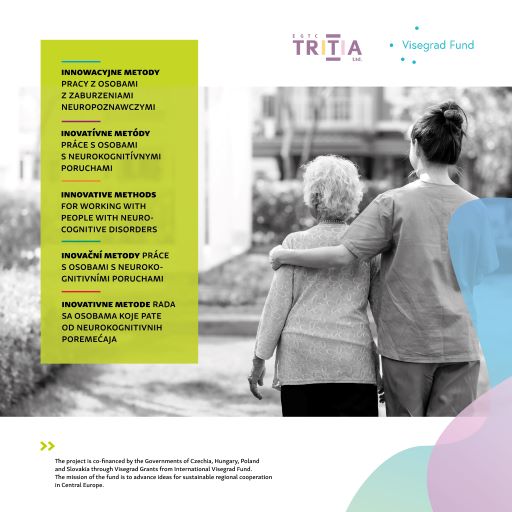
We are happy to present our latest publication created as part of the project “V4 for the development of common Social Europe”.
The authors of the articles are outstanding Polish specialists working with people with dementia. With this publication, we wish to share the best practices in this area with our partner organisations and social workers from the Czech Republic, Serbia, and Slovakia. This is why the book has been translated from Polish into the languages of our partner organisations – Czech, Serbian, and Slovak – as well as into English, so that it could reach a wider audience in Europe and beyond.
The publication consists of four articles about methods of working with elderly people, including people with dementia. The authors of the subsequent articles are: Marlena Meyer – certified consultant and coach in the Positive Approach to Care educational programme; Maria Jarco-Działak – psychologist, neuropsychologist, and gerontotherapist, leader of social projects addressed to senior citizens; Agnieszka Żelwetro – specialist in clinical psychology and neuropsychology; co-creator of the Reminiscence Theatre; and Monika Stroińska – certified consultant and coach in the Montessori Senior and Spaced Retrieval methods, gerontopsychologist, and founder of the Montessori Senior Centre. In their education process as well as in educating others, all the authors draw inspiration from approaches successfully implemented in other countries across the globe.
All the articles contain detailed activity plans for practical use in social care centres, residential care homes, and other institutions focused on sustaining physical and mental abilities of elderly people and their relationship building capacity. The articles are addressed to families of people with dementia as well.
The first article presents the main principles and practical applications of the Positive Approach to Care educational programme developed by occupational therapist Teepa Snow. Marlena Meyer defines various forms of dementia and the spectrum of symptoms and brain changes that occur in people living with dementia. The author of the article outlines the characteristics of the Positive Approach to Care approach in neurodegenerative care. She proposes recommendable work methods and debunks harmful stereotypes about dementia.
The second article describes forms of group activities for older adults based on the reminiscence method. Maria Jarco-Działak talks about the power of memory, memory exercises, and recollecting past events and sensations in therapy activities addressed to elderly people, including persons with dementia. The author presents tools, topics, and methods for such activities and valuable guidelines for instructors and therapists.
In the third article, the phenomenon of reminiscence is presented as the foundation for the author’s original method – the Reminiscence Theatre. In her approach, Agnieszka Żelwetro combines methods of reminiscence therapy with drama therapy and art therapy. In this model, theatre-related activities incorporating memory work bring positive results to participants: they improve memory, communication, and concentration, and they increase overall satisfaction. Thanks to the detailed activity plans, instructors, caregivers, and therapists can easily introduce the Reminisce Theatre tools in their practice – in a variety of conditions and for a variety of patients.
The final article is a presentation of another valuable method of working with older adults – Montessori Senior (Montessori Lifestyle®). Monika Stroińska shows how it can be adapted for therapy work with persons with neurocognitive disorders. In this approach, a person and their needs are the focus rather than the disease and its symptoms, whereas forms of support are based on preserved skills rather than deficits, in line with the motto “Help me to do it myself”. The author outlines practical applications and positive benefits of the Montessori method for senior citizens.
We hope that our publication will reach numerous centres and individuals that take care of elderly persons, also those with dementia. The methods presented in the articles are useful and effective – by promoting them widely, we can make actual positive difference in the general attitude of society and institutions towards elderly people and people with dementia in Poland and in other countries. We expect that through this publication, we will contribute both to systemic changes connected with the introduction of tangible measures and to changes in the way people perceive and think about dementia.
